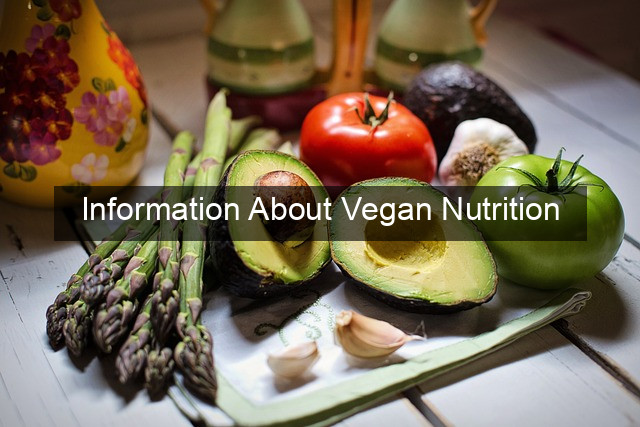Information About Vegan Nutrition

- Information About Vegan Nutrition
- Vegan Nutrition: A Comprehensive Guide
- Essential Nutrients for Vegans
- Protein Powerhouses
- Calcium for Strong Bones
- Iron for Energy and Vitality
- Potential Nutrient Deficiencies and How to Avoid Them
- Vitamin B12: Supplementation is Key
- Omega-3 Fatty Acids: Plant-Based Sources
- Planning a Balanced Vegan Diet
- Meal Planning and Preparation
- Reading Food Labels Carefully
- Vegan Nutrition for Different Life Stages
- Children and Adolescents
- Pregnancy and Breastfeeding
- Conclusion
- Frequently Asked Questions (FAQ)
- Common Questions About Veganism and Nutrition

Vegan Nutrition: A Comprehensive Guide
More and more people are embracing veganism, a lifestyle choice that excludes all forms of animal products, including meat, poultry, fish, dairy, eggs, and honey. This shift towards plant-based eating is driven by various factors, from ethical concerns about animal welfare to environmental awareness and the pursuit of improved health. But transitioning to a vegan diet requires careful planning to ensure adequate intake of essential nutrients. This comprehensive guide delves into the intricacies of vegan nutrition, providing valuable insights into achieving a balanced and healthy plant-based diet. We’ll explore the key nutrients to focus on, potential deficiencies to be aware of, and practical tips for building delicious and nutritious vegan meals. Whether you’re a seasoned vegan or just beginning to explore this lifestyle, understanding the principles of vegan nutrition is crucial for maximizing its benefits.
Essential Nutrients for Vegans
Protein Powerhouses
Protein is a crucial building block for tissues, enzymes, and hormones. While often associated with animal products, numerous plant-based sources offer ample protein. Legumes, such as lentils, chickpeas, and beans, are excellent choices. Tofu, tempeh, and edamame, derived from soybeans, are also complete protein sources, meaning they contain all nine essential amino acids. Nuts, seeds, and whole grains contribute to daily protein intake as well. Combining various plant-based protein sources throughout the day ensures optimal amino acid balance.
Incorporating a variety of protein sources into your diet not only provides the necessary amino acids but also adds flavor and texture to your meals. Experimenting with different legumes, nuts, and seeds can make vegan eating exciting and satisfying. Adding a scoop of protein powder to smoothies or oatmeal can be a convenient way to boost your intake, especially for those with higher protein needs.
It’s important to note that while animal-based protein sources often contain higher concentrations of protein per serving, plant-based options offer other valuable nutrients, like fiber and antioxidants. Focusing on a diverse range of whole plant foods can easily meet your protein requirements.
Calcium for Strong Bones
Calcium is essential for maintaining strong bones and teeth. While dairy is a common source, vegans can obtain calcium from plant-based alternatives like fortified plant milks (almond, soy, oat), leafy green vegetables (kale, collard greens), and calcium-set tofu. Including these foods regularly in your diet can help meet your calcium needs.
Paying attention to the calcium content of fortified plant milks is essential. Check the nutrition labels and opt for brands that provide adequate calcium per serving. Adding calcium-rich foods to smoothies, soups, and stews is an easy way to boost your intake.
Vitamin D plays a crucial role in calcium absorption. Since sun exposure is the primary source of vitamin D, consider supplementing during winter months or if you have limited sun exposure. Fortified foods and vitamin D supplements can also help ensure adequate levels.
Iron for Energy and Vitality
Iron is vital for red blood cell production and oxygen transport. Plant-based sources of iron include legumes, leafy greens, fortified cereals, and dried fruits. Combining these foods with vitamin C-rich sources, like citrus fruits, enhances iron absorption.
Cooking in cast iron cookware can also increase the iron content of your meals. Soaking legumes before cooking can improve their digestibility and nutrient absorption.
It’s important to note that iron from plant-based sources (non-heme iron) is not as readily absorbed as iron from animal sources (heme iron). Therefore, consuming iron-rich plant foods with vitamin C-rich foods is crucial for maximizing absorption.
Potential Nutrient Deficiencies and How to Avoid Them
Vitamin B12: Supplementation is Key
Vitamin B12 is primarily found in animal products and plays a crucial role in nerve function and red blood cell formation. Vegans must supplement with vitamin B12 to prevent deficiency. This can be done through fortified foods, like nutritional yeast, or B12 supplements.
Regular blood tests can monitor B12 levels and ensure adequate intake. Consulting with a registered dietitian or healthcare professional can help determine the appropriate dosage and form of supplementation.
Ignoring B12 supplementation can lead to serious health consequences, including nerve damage and anemia. Therefore, it’s crucial for vegans to prioritize B12 intake.
Omega-3 Fatty Acids: Plant-Based Sources
Omega-3 fatty acids are essential for brain health and reducing inflammation. While fatty fish is a common source, vegans can obtain omega-3s from plant-based sources like flaxseeds, chia seeds, hemp seeds, and walnuts.
Incorporating these foods regularly into your diet can help meet your omega-3 needs. Adding ground flaxseeds to smoothies or oatmeal is a convenient way to boost your intake.
While the body can convert some plant-based omega-3s (ALA) into the active forms (EPA and DHA), the conversion rate is limited. Consider supplementing with algae-based omega-3 supplements to ensure adequate intake of EPA and DHA.
Planning a Balanced Vegan Diet
Meal Planning and Preparation
Planning your meals in advance can help ensure a balanced and varied vegan diet. Creating a weekly meal plan and preparing some meals ahead of time can save time and prevent reliance on less healthy convenience foods.
Focus on incorporating a variety of plant-based protein sources, whole grains, fruits, vegetables, and healthy fats into your meals. Experiment with different cuisines and recipes to keep your meals interesting and enjoyable.
Batch cooking staples like grains, beans, and roasted vegetables can simplify meal preparation throughout the week. Having healthy snacks on hand, like fruits, nuts, and seeds, can prevent unhealthy cravings.
Reading Food Labels Carefully
Reading food labels carefully is essential for vegans to identify hidden animal products and ensure adequate nutrient intake. Pay attention to ingredients lists and nutrition information panels.
Look for fortified foods to boost your intake of certain nutrients, like calcium, vitamin D, and B12. Be mindful of added sugars, salt, and unhealthy fats in processed vegan foods.
Choosing whole, unprocessed plant foods whenever possible is the best way to ensure a healthy and nutritious vegan diet. Limit your intake of processed vegan meats and cheeses, which can be high in sodium and unhealthy fats.
Vegan Nutrition for Different Life Stages
Children and Adolescents
Vegan diets can be healthy for children and adolescents, but careful planning is essential to ensure adequate nutrient intake. Focus on providing a variety of nutrient-rich foods, including protein sources, calcium-rich foods, and iron-rich foods.
Consulting with a registered dietitian or pediatrician can help ensure that a vegan child’s nutritional needs are being met. Paying attention to growth and development is crucial.
Supplementation with vitamin B12, vitamin D, and potentially omega-3 fatty acids may be necessary for vegan children and adolescents.
Pregnancy and Breastfeeding
Vegan diets can be followed during pregnancy and breastfeeding, but careful planning and monitoring are essential. Ensuring adequate intake of protein, iron, calcium, vitamin B12, and omega-3 fatty acids is crucial.
Working closely with a healthcare professional and registered dietitian is essential to ensure the nutritional needs of both the mother and baby are met.
Supplementation may be necessary to meet increased nutrient demands during pregnancy and breastfeeding.
Conclusion
Embracing a vegan lifestyle can be a rewarding journey towards better health, environmental sustainability, and animal welfare. By understanding the principles of vegan nutrition and focusing on a balanced intake of essential nutrients, individuals can thrive on a plant-based diet. From prioritizing protein powerhouses to ensuring adequate intake of calcium, iron, and crucial vitamins like B12, careful planning and informed choices are key. By embracing a variety of whole plant foods, incorporating smart supplementation where needed, and seeking guidance from healthcare professionals, vegans can enjoy the numerous benefits of this compassionate and sustainable way of eating. Remember, a well-planned vegan nutrition plan can be both delicious and deeply nourishing for a vibrant and healthy life.
Frequently Asked Questions (FAQ)
Common Questions About Veganism and Nutrition
- Is a vegan diet expensive?
- Where do vegans get their protein?
- Can children thrive on a vegan diet?
A vegan diet can be affordable or expensive, depending on your food choices. Focusing on staples like beans, lentils, rice, and seasonal produce can be very budget-friendly.
Vegans get protein from a variety of plant-based sources, including legumes, tofu, tempeh, nuts, seeds, and whole grains.
Yes, children can





